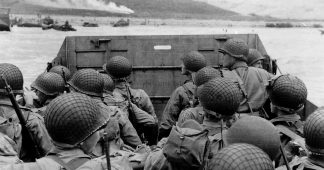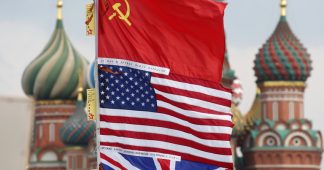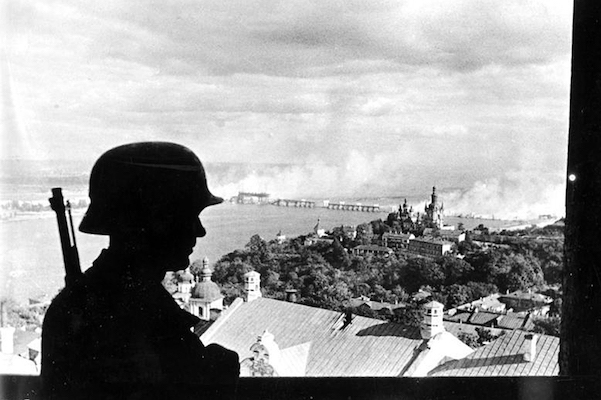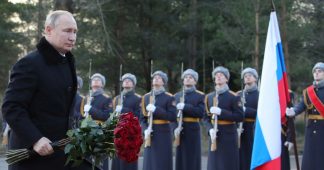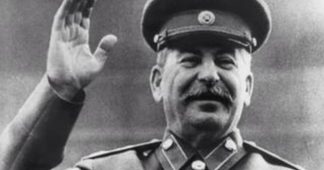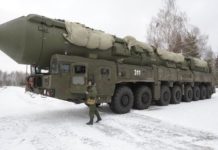Claims that glorification of Soviet Russia’s role in victory over Nazis is part of “official propaganda.”
By Jeremy Kuzmarov
On May 9, 2021, Russians celebrated Victory in Europe (V-E) Day with a customary parade honoring the sacrifices of the Soviet people in World War II.
Rather than reporting on the day’s festivities, The Washington Post ran a story by its Moscow bureau chief, Robyn Dixon, about a Russian man who has spent years digging into archives to find out who killed his great-grandfather in 1938 during purges led by Soviet ruler Joseph Stalin.
Noting that “digging up the truth from the past can still bring trouble in today’s Russia,” Dixon wrote that, under current Russian President Vladimir Putin, “official propaganda has sought to glorify Russia as a victim of foreign aggression that saved the world in World War II, meanwhile playing down the horrors of Soviet massacres and repressions including the ‘Great Terror’ that Stalin led in the 1930s.”[1]
Dixon’s remarks represent historical revisionism at its worst; whatever the truth about the latter claim, Russia was a victim of foreign aggression and did save the world from Nazism in World War II.
Historians estimate that 26 million Russians were killed fighting the Nazis, while 1,710 Russian cities and 70,000 towns and villages were destroyed, along with 31,850 factories, 84,000 schools, 65,000 kilometers of railway and 1,974 collective farms.
The Soviet Red Army destroyed 507 German divisions and 100 allied Axis divisions, 77,000 enemy planes, and 48,000 enemy tanks and armored vehicles. It further accounted for between 75 and 80 percent of Axis casualties in World War II, killing at least 10 million German soldiers.[2]
General Douglas MacArthur stated that in none of the many wars he had participated in had he observed “such an effective resistance to the heaviest blows of a hitherto undefeated enemy, followed by a smashing counterattack which is driving the enemy back to his own land. The scale and grandeur of this effort marks it as the greatest military achievement in all of history.”[3]
U.S. President Franklin Roosevelt and British Prime minister Winston Churchill also acknowledged the Soviet Union’s “gigantic effort” in fighting and ultimately defeating Hitler’s Germany.[4]
Churchill wrote in a letter to Stalin on September 27, 1944, that “it is the Russian army that tore the guts out of the German military machine.” Roosevelt in a fireside chat told the American public two years earlier that “these Russian forces have destroyed and are destroying more armed power of our enemies—troops, planes, tanks and guns—than all the other united nations put together.”[5]
A generation later, President John F. Kennedy, in a speech at the American University in Washington, D.C., on June 10, 1963, five months before his assassination, stated that “no nation in the history of battle has every suffered more than the Russians suffered in the course of World War II. At least twenty million lost their lives. Countless millions of homes and farms were burned or sacked. A third of the nation’s territory, including nearly two-thirds of its industrial base, were turned into a wasteland.”[6]
But Robyn Dixon and The Washington Post would like us to believe that it is propaganda for Putin to highlight Russia’s role as a victim of foreign aggression and engine of Nazism’s defeat.
Never mind that historians consider the August 1942-February 1943 Battle of Stalingrad the decisive turning point in World War II.[7]
Or that it was Russian Red Army troops that liberated many of the concentration camps where Jews were systemically slaughtered, including Auschwitz.
The New Republic at the time declared that “Hitler has lost the war, and for this the Russians deserve the major share of the credit.”[8]
New York Times correspondent Ralph Parker proclaimed that “it would need a Tolstoy to describe the heroic endurance of the men and women [successfully fighting the Nazis].”[9]
But this kind of reporting would be heresy today in the age of Russia-Gate and the new Cold War, where nothing positive can be said about Russia.
Dixon—a Loyal Foot Soldier in the New Cold War
Robyn Dixon is an Australian who won an Associated Press award for a series on terrorism that ignored its state-sponsored variety.
She has served as a loyal foot soldier in the anti-Russia, anti-Putin campaign, which was initiated because Russia has become stronger and more independent under Putin than under Boris Yeltsin in the 1990s.
Dixon’s articles on Russia are one-sided and biased.
She portrays Putin as an authoritarian leader bent on establishing a totalitarian surveillance state like China,[10] subverting sovereign countries and promoting militarism.[11]
She never mentions Russia’s positive economic transformation since the 1990s or from whom Putin draws his support.
In Syria, Dixon casts Russia as an aggressor bent on retaining two military bases (Hmeimim Air Base and the Tartus Naval Base), and which carried out war crimes in conjunction with Syrian leader Bashir al-Assad.[12]
No mention is made of the crimes committed by the jihadist rebels backed by the CIA, nor of the U.S. desire to control the oil resources and its establishment of 11 military bases in Syria.[13]
For Ukraine, Dixon depicts Russia again as the aggressor[14] without addressing Western support for the 2014 coup d’état which imposed a hostile regime on Russia’s border that wanted to join the North Atlantic Treaty Organization (NATO), and provoked the secession of two eastern Ukrainian provinces by imposing draconian language laws on them.[15]
For months, Dixon has reported favorably on Russian opposition leader Alexei Navalny—leaving out his anti-immigrant and other regressive views, and the fact that he has extremely limited support within Russia.[16]
In a December 2020 article, Dixon reported uncritically on a Bellingcat report implicating Russia’s intelligence services in Navalny’s alleged poisoning.
She left out that Bellingcat is an adjunct of Western intelligence agencies and proved only that Navalny had been trailed by secret service agents.[17]
In another article, Dixon promoted CIA disinformation—first leaked to the New York Times –accusing a Russian military intelligence unit of paying bounties to Taliban-linked militias for killing U.S. soldiers in Afghanistan.[18]
Dixon also accused Russia of setting off explosives at a weapons depot in Bulgaria and in the Czech Republic nearly a decade ago to disrupt Western flows of arms to Georgia and Ukraine.
She did not, however, report on allegations by Belarus President Alexander Lukashenko that he was a victim of a Western-backed coup and assassination plot.[19]
This is not surprising because Dixon has championed the anti-Lukashenko opposition and has caricatured Lukashenko as a tin-pot dictator[20] –ignoring how he had built a strong base of support by resisting Western-imposed shock therapy programs that resulted in record inequality levels throughout the region.[21]
On April 28th, Dixon co-authored a front-page story entitled “Brazil Rejects Russian Vaccine, Citing Many ‘Flaws,’” which upheld the Brazilian health agency’s view that the Sputnik V COVID-19 vaccine lacked proper quality control, even though it had been hailed as safe and more than 91 percent effective in a peer-reviewed article in The Lancet in February.[22]
Dixon’s article was characteristic of a biased manner of reporting in which only negative things can be said about Russia, and Russia’s positive contributions—like development of a COVD-19 vaccine or defeat of Nazism in World War II—are dismissed.
One Positive Article
In surveying Dixon’s articles on Russia for The Washington Post, I came across one positive piece that provided a startling contrast to her V-E Day article from this year.
Published on August 5, 2020, the piece was titled “The last of Stalin’s female fliers.” It profiled Galina Brok-Beltsova, age 95, the last surviving member of Stalin’s three famous all-female air regiments, who took part in the 1945 Battle of Königsberg, which liberated Germany’s easternmost city from Nazi rule.
Dixon told the story in the article of how Brok-Beltsova signed up for the Red Army after coming out of a movie theater with her girlfriends and hearing an air-raid siren.
In basic training, she slept in “freezing, filthy stables” in preparation to “fight the invading Nazis,” meeting her husband of 60 years who was in charge of her training regimen.
Brok-Beltsova admitted that the Soviet Air Force decimated much of Königsberg but said that this was because the Germans had tried to “destroy us and occupied our villages and towns.”
After the war Brok-Beltsova became a history professor and spoke at military events where the young officers marveled at her courage.
On Victory Day in 2020, she was invited to a luncheon with Putin, though the festivities were canceled because of COVID-19. Dixon wrote that for Brok-Beltsova nevertheless, “Victory Day carries the same message of glory, triumph and grief it always has.”[23]
These latter comments contradict Dixon’s more recent remarks about Putin and propaganda surrounding World War II.
The Russian people clearly revere veterans like Brok-Beltsova whose heroism and sacrifices were genuine.
What the …?
The worst of Dixon’s reporting on Russia is unfortunately no anomaly at The Washington Post.
During the 2016 election, the Post led the way in accusing Russia of election interference and cyber-hacking absent concrete proof, and in 2020 insinuated that Bernie Sanders was a Russian asset based on the claims of anonymous intelligence sources notorious for advancing disinformation.
Since 2013, The Washington Post has been owned by Amazon CEO Jeff Bezos, a multibillionaire who signed a $600 million computing deal between the Central Intelligence Agency (CIA) and Amazon.
Bezos’s warm relationship with the CIA, combined with the Post’s reporting on Russia, indicates a pattern of continuity from the original Cold War when Carl Bernstein reported that more than 400 American journalists had “secretly carried out assignments for the CIA.”
Dixon may or may not herself be compromised but her reporting clearly serves the interests of the U.S. national security state, and has contributed to negative public attitudes toward Russia, which are lending support for the new Cold War.
A recent Gallup poll found that just 22% of U.S. citizens view Russia favorably, while 72% hold unfavorable views toward it.
Democrats—more prone to read the Post—hold particular hostility toward Russia, with fewer than one-in-six (16%) telling Gallup they maintained positive opinions about the country, as opposed to 25% of Republicans and 24% of independents.
These totals indicate a high level of social conditioning whose end result could be war.
- Robyn Dixon, “He spent years uncovering the Stalin-era execution of his great-grandfather. Lawsuits seek to bury the evidence,” The Washington Post, May 9, 2021. ↑
- Jacques Pauwels, The Myth of the Good War: America in the Second World War (Winnipeg: Lorimer, 2002), 91; Eric Margolis, “The Soviet Union Defeated Germany in World War II—Not the Western Forces,” The Unz Review, May 11, 2020, https://www.unz.com/emargolis/the-soviet-union-defeated-germany-in-world-war-ii-not-the-western-forces/ ↑
- Quoted in D.F. Fleming, The Cold War and Its Origins, 1917-1960, vol. 1: 1917-1950 (New York: Doubleday & Co., 1961), 148. ↑
- Margolis, “The Soviet Union Defeated Germany in World War II—Not the Western Forces.” Most Englanders after the war chose the USSR when asked which nation had done most to help win the war. Lawrence Wittner, Rebels Against War: The American Peace Movement, 1933-1983 (Philadelphia: Temple University Press, 1984), 103. ↑
- Helga Zepp-Larouche, “Putin’s Discussion of the Second World War Can Prevent World War III,” June 26, 2020, http://www.nkibrics.ru/posts/show/5ef59a456272695143350000; Alexander Werth, Russia at War, 1941-1945: A History (New York: Carroll & Graf, 1964), xiv. Ernest Bevin, British Minister of Labor in the war-time government, acknowledged the “tremendous effort of the Soviet people,” noting that “our children’s children will look back, through their history books, with admiration and thanks for the heroism of the great Russian people.” ↑
- Quoted in Werth, Russia at War, 1941-1945, xi. ↑
- See Richard Overy, Why the Allies Won (New York: W.W. Norton, 1997). ↑
- Overy, Why the Allies Won, 84; Werth, Russia at War, 1941-1945, 543; Maurice Isserman, Which Side Were You On? The American Communist Party during the Second World War (Urbana: University of Illinois Press, 1993), 158. ↑
- Quoted in Oliver Stone and Peter Kuznick, The Untold History of the United States (New York: Gallery Books, 2012), 106. ↑
- See for example Robyn Dixon, “Russia’s surveillance state still doesn’t match China. But Putin is racing to catch up,” The Washington Post, April 15, 2021; Dixon, “He spent years uncovering the Stalin-era execution of his great-grandfather;” Robyn Dixon, “Russia’s rush to ramp up surveillance state,” The Washington Post, April 18, 2021. ↑
- Robyn Dixon, “Russia expands troops near Ukraine,” The Washington Post, April 20, 2021. ↑
- Robyn Dixon, “Russia’s moves in Idlib part of wider strategy,” The Washington Post, February 14, 2020. ↑
- See Tim Anderson, The Dirty War on Syria (Global Research, 2016); Bill Van Auken, “U.S. Stages Military Buildup to Steal Syria’s Oil,” World Socialist Web Site, August 25, 2020. ↑
- Robyn Dixon, “Russia expands troops near Ukraine,” The Washington Post, April 20, 2021. ↑
- For background, see Richard Sakwa, Frontline Ukraine: Crisis in the Borderlands (London: I.B. Tauris, 2016); Chris Kaspar de Ploeg, Ukraine in the Crossfire (Atlanta: Clarity Press Inc., 2017). ↑
- Robyn Dixon, “Navalny lawyer is arrested after challenging secrecy in court case,” The Washington Post, April 30, 2021; Robyn Dixon, “Thin Navalny, in court by video, calls Putin a ‘naked king,” The Washington Post, April 29, 2021, Isabelle Khurshudyan, Robyn Dixon, “Putin critic is sent to prison for 32 months,” The Washington Post, February 2, 2021. ↑
- Isabelle Khurshudyan, Robyn Dixon, “Report implicates Kremlin in poisoning of Navalny,” The Washington Post, December 14, 2020. For critical review of the Navalny poisoning, see Jeremy Kuzmarov, “Is Russian Opposition Leader Alexey Navalny a Key Prop in a Psychological Warfare Operation Designed to Bring Down Vladimir Putin?” CovertAction Magazine, March 13, 2021; Max Blumenthal, “Reuters, BBC, and Bellingcat participated in covert UK Foreign Office-funded programs to ‘weaken Russia,’ leaked docs reveal,” The Grayzone Project, February 20, 2021.↑
- Robyn Dixon, “What’s behind Russia’s growing ties to the Taliban,” The Washington Post, June 30, 2020. For critical analysis, see Alan Macleod, “In ’Russian Bounty’ Story, Evidence-Free Claims From Nameless Spies Became Fact Overnight,” Fairness and Accuracy in Reporting, July 3, 2020, https://fair.org/home/in-russian-bounty-story-evidence-free-claims-from-nameless-spies-became-fact-overnight/. The New York Times, which originally reported the Russian bounty story, admitted later that evidence was lacking. Charlie Savage et al. “Russian Spy Team Left Traces That Bolstered C.I.A.’s Bounty Judgment: But the U.S. lacked ‘evidence that the Kremlin directed this operation,’ newly declassified information about the Russian team showed,” The New York Times, May 7, 2021.↑
- Loveday Morris, Robyn Dixon, “Bulgaria points to Russia in arms depot blasts, widening European probes,” The Washington Post, April 28, 2021; Loveday Morris, Ladka Bauerova and Robyn Dixon, “Reverberations from Russian-Czech depot dispute grow,” The Washington Post, April 20, 2021; “Suspects in Lukashenko Assassination Plot Plead Guilty, Reveal Details of Conspiracy,” TASS, Russian News Agency, April 28, 2021. ↑
- Robyn Dixon, “Belarus’s Lukashenko says he would rather be killed than allow new vote,” The Washington Post, August 17, 2020. Dixon claimed that Lukashenko had ruled Belarus since 1994 through “flawed elections, disregarding constitutional term limits, jailing critics and election rivals and cracking down on protests.” See also Robyn Dixon, “Belarus’s strongman opts for vodka over lockdowns,” The Washington Post, March 29, 2020. ↑
- For a balanced and primarily positive assessment of Lukashenko, see Stewart Parker, The Last Soviet Republic: Alexander Lukashenko’s Belarus (London: Trafford Publishing, 2007). ↑
- Erin Cunningham and Robyn Dixon, “Brazil rejects Russian vaccine, citing many ‘flaws,’” The Washington Post, April 28, 2021. ↑
- Robyn Dixon, “The Last of Stalin’s Female Fliers,” The Washington Post, August 5, 2020. ↑
Published at covertactionmagazine.com
